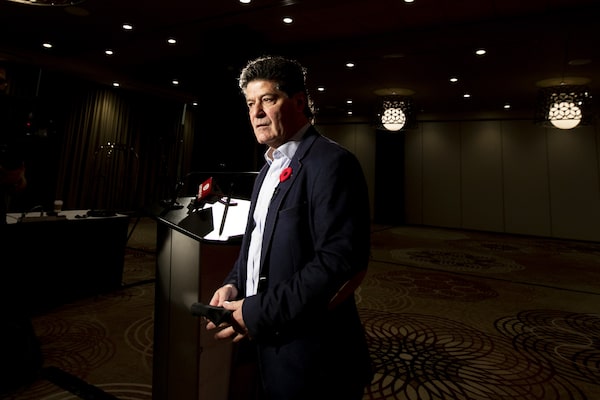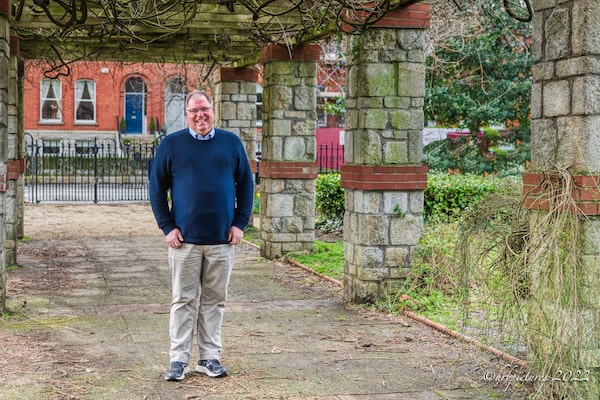Good evening, let’s start with today’s top stories:
Russia’s unprovoked war on Ukraine must come with “ruinous costs” for Moscow, spurred by European and global leaders uniting with a “deliberate, mindful effort” to safeguard democracy, Prime Minister Justin Trudeau told the European Parliament in Brussels on Wednesday evening.
Trudeau’s address to the Parliament launched two days of meetings in Belgium for the Prime Minister as the conflict in Europe drags into its second month. On Thursday, he will join other world leaders – including U.S. President Joe Biden – at NATO headquarters for an emergency summit, where delegates are expected to announce new sanctions against Russia and contingencies in the case of nuclear or chemical weapons use.
NATO Secretary-General Jens Stoltenberg told media Wednesday afternoon that members will also tighten existing sanctions against Moscow and discuss longer-term plans to strengthen the Western military alliance, particularly along its eastern flank.
This is Trudeau’s second visit Europe in the past month. During his address, he stressed the importance of transatlantic co-operation to defend democracy in the face of Russia’s invasion of Ukraine, as well as humanitarian and military aid, and developing plans to rebuild the country after the war. He also told the European Union’s Parliament that the bloc has Canada’s full support as it squeezes Russia economically and politically in a bid to end the conflict.
Meanwhile, Russia will seek payment in rubles for gas sales from “unfriendly” countries, Putin said on Wednesday, sending European gas prices soaring on concerns the move would exacerbate the region’s energy crunch.
European countries’ dependence on Russian gas to heat their homes and power their economies has been thrown into the spotlight since Moscow sent troops into Ukraine on Feb. 24 and the subsequent imposition of Western sanctions aimed at isolating Russia economically.
With the financial noose tightening and the European Union split on whether to sanction Russia’s energy sector, Putin hit back with a clear message: If you want our gas, buy our currency.
“Russia will continue, of course, to supply natural gas in accordance with volumes and prices … fixed in previously concluded contracts,” Putin said at a televised meeting with top government ministers.
Read more:
- Russia-Ukraine live updates
- Indian medical students face uncertain future after evacuation from Ukraine
Prime Minister Justin Trudeau addresses the European Parliament in Brussels, Belgium on March 23, 2022.The Canadian Press
This is the daily Evening Update newsletter. If you’re reading this on the web, or it was sent to you as a forward, you can sign up for Evening Update and more than 20 more Globe newsletters here. If you like what you see, please share it with your friends.
Former Unifor boss Jerry Dias accepted $50,000 from supplier of COVID-19 rapid test kits, union alleges
Former Unifor leader Jerry Dias breached the union’s code of ethics by accepting $50,000 from a supplier of COVID-19 rapid test kits in exchange for promoting it to employers of union members, Unifor’s national executive board said on Wednesday.
Dias, who abruptly announced his retirement on March 11 citing health issues, is being charged by the union for the constitutional breach, and will face a hearing in April.
At a special news conference organized by the union to address the investigation into Dias, Unifor national secretary-treasurer Lana Payne said he had accepted the $50,000 from an unnamed supplier of the test kits at some point before Jan. 20, 2022. The investigation, conducted by an external party, found he had promoted the supplier’s test kits in December, 2021, and January, 2022, directly to employers and also got Unifor staff members to promote them at his direction.
Several employers purchased those test kits, Payne said.

Unifor National President Jerry Dias and the Unifor Bargaining Committee representatives announcing a new tentative agreement with GM on Nov. 5, 2020 in Toronto, Ontario.Carlos Osorio/The Canadian Press
Ontario approves new rules governing use of financial planner and adviser titles
Ontario’s Finance Minister has given the green light for a new set of rules that will oversee employees in the financial services industry who use the titles “financial planner” or “financial adviser” to protect investors from doing business with unqualified individuals.
On Tuesday, the Financial Services Regulatory Authority of Ontario, or FSRA – the financial regulatory body that has been spearheading the rule changes since 2019 – announced that the Financial Professionals Title Protection Rule will be proclaimed into force in Ontario on March 28.
Financial advisers typically help clients manage their investments, while financial planners help clients prepare to meet a goal such as retirement or saving for a child’s education. The coming rule changes will make qualifications and credentials mandatory for people wanting to work in the industry and refer to themselves by either title.
“Until now, there has been no regulation of the usage of Financial Planner or Financial Advisor titles. This has contributed to confusion among consumers, and questions about the expertise of individuals offering financial planning and advisory services,” Huston Loke, executive vice-president of market conduct at FSRA, said in a statement.
“Deciding how to invest your money is complicated and emotional and requires expertise and good judgment. This change is long overdue and offers something consumers have been asking for: clarity and confidence when working with their financial professional.”
Toronto's Financial District, Feb. 11 2021.Fred Lum/The Globe and Mail
ALSO ON OUR RADAR
Canada urged to protect forests as part of plan to reduce carbon emissions: Nearly 100 scientists from around the world are urging the federal government to prioritize the protection of Canada’s most biodiverse forests as part of its first emissions reduction plan, due by the end of this month. They are also calling on Ottawa to launch a comprehensive review of the way the government quantifies emissions in the forestry sector.
Stellantis, LG announce $5.1-billion EV battery plant in Windsor, Ont.: The first large-scale electric-vehicle battery plant in Canada will be built in Windsor, Ont., a $5.1-billion joint venture between global auto giant Stellantis NV and South Korea’s LG Energy Solution, the federal and provincial governments announced on Wednesday.
Madeleine Albright, first female U.S. Secretary of State, dies: Madeleine Albright, the first female U.S. Secretary of State, has died of cancer, her family said Wednesday. She was 84. President Bill Clinton chose Albright as America’s top diplomat in 1996, and she served in that capacity for the last four years of the Clinton administration.
MARKET WATCH
U.S. stocks ended sharply lower on Wednesday as Western leaders began gathering in Brussels to plan more measures to pressure Russia to its halt conflict in Ukraine and oil prices jumped. The TSX snapped a six-day winning streak, with both financials and tech stocks seeing sharp declines.
Responding to Western sanctions that have hit Russia’s economy hard, President Vladimir Putin said Moscow will seek payment in roubles for natural gas sales from “unfriendly” countries, while its forces bombed areas of the Ukrainian capital Kyiv a month into their assault.
Oil prices jumped 5 per cent to over $121 a barrel and U.S. natural gas futures edged up to a seven-week high. While higher oil prices benefit energy shares, they are a negative for consumers and many businesses. The S&P 500 energy sector rose along with utilities.
According to preliminary data, the S&P 500 lost 55.77 points, or 1.21 per cent, to end at 4,455.84 points, while the Nasdaq Composite lost 185.69 points, or 1.32 per cent, to 13,923.13. The Dow Jones Industrial Average fell 453.84 points, or 1.30 per cent, to 34,353.62.
Got a news tip that you’d like us to look into? E-mail us at tips@globeandmail.com. Need to share documents securely? Reach out via SecureDrop.
TALKING POINTS
We’ve come so far – let’s not turn masking into a political symbol now
“An excruciating consequence of the removal of provincial mask mandates is that we have all become audience to the worst display of hollow sanctimony and vain proselytizing ever to be ascribed to a little piece of material. Those who continue to wear masks, we are told, are moral leaders – righteous servants – who wear their sense of collective responsibility literally on their faces. Those who do not are selfish brutes who hate your grandma and possibly believe in eugenics. There is no in-between.” – Robyn Urback
After decades of timidity, can Canada’s allies still take us seriously?
“After decades of willful neglect, Canada’s international policy cupboard is bare. To regain its standing in both NATO and Washington, Canada has to deliver on real capabilities: robust expeditionary capacity, ballistic missile defence, the renewal of the North American Aerospace Defence Command, specifically the replacement of the North Warning air defence system and ballistic missile defence, and a stand-alone foreign intelligence agency.” – Christian Leuprecht and Bruno Charbonneau
What’s in it for the NDP? Jagmeet Singh’s deal with the Liberals is one big bet
“By negotiating a confidence-and-supply agreement with Prime Minister Justin Trudeau’s Liberal government, NDP Leader Jagmeet Singh and his party are doing what most Canadians want our politicians to do when minority parliaments are elected: work together to get things done.” – Brian Topp
Justin Trudeau finds another way to neuter Parliament
“You’ve got to hand it to Prime Minister Justin Trudeau: He knows how to turn a minority Liberal government into one that’s able to function like a majority. His method is simple. All you have to do is handcuff Parliament’s role as a check on government.” – The Editorial Board
LIVING BETTER
Should you jump into retirement or ease in?

Tim Brennan is among many retirement-age Canadians making the decision to ease into retirement.Hans Peter Beinert
In 2019, Tim Brennan began thinking about what his postretirement life would look like.
The 60-year-old Halifax entrepreneur had spent 21 years with the company he co-founded, Fit First Technologies, which produces software tools for human resources and recruiting. That December, he sat down with his partners and began talking about how he might wind down his involvement.
Then came the pandemic lockdowns weeks later, which put his plans into perspective.
“I started walking in a city park every Wednesday afternoon during the first lockdown with a group of four or five guys I knew from a lawn-bowling club,” he recalls. “And I’d ask, ‘What do you do as a retired person?’”
The biggest take-away from those walks, he says, was to “find out what’s important to you, and focus on that in retirement.”
TODAY’S LONG READ
On their cellphones, Ukrainians keep mobile mementoes of homes and lives ruined by Russian invasion

Ukrainian family at the Bratislava main train station, on March 8, 2020.Dorota Holubova/The Globe and Mail
Refugees in Slovakia got out their mobile devices to show The Globe and Mail which memories of home they’re hanging on to.
Evening Update is written by Emerald Bensadoun. If you’d like to receive this newsletter by e-mail every weekday evening, go here to sign up. If you have any feedback, send us a note.